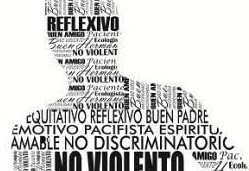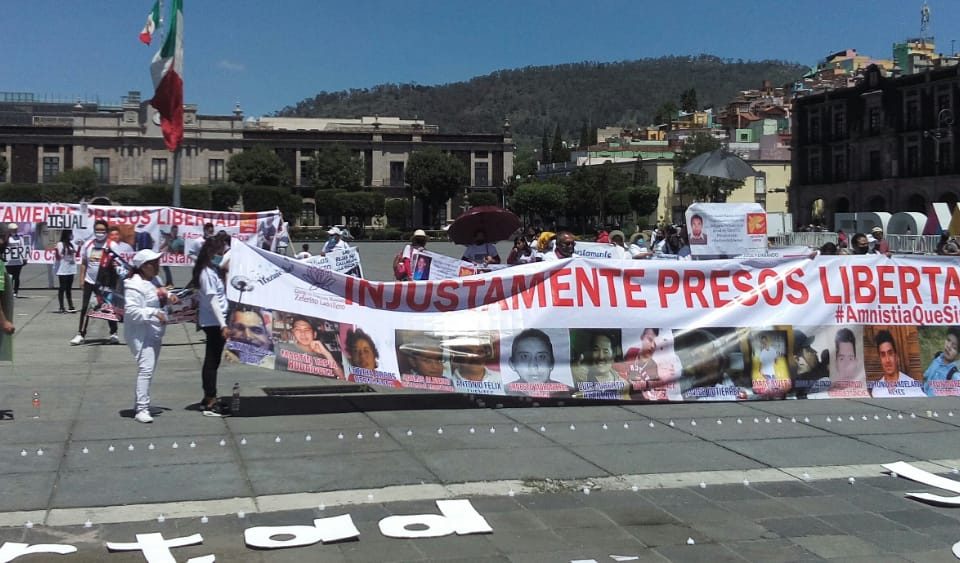
Hides Metepec salary of 4 officials; among them Gamboa’s daughter
November 27, 2019
From north to south
December 2, 2019Men are looking for … with new ways of being

HIGHLIGHTS
Men are looking for ... with new ways of being

November 27th, 2019
Facing an increase in violence in the State of Mexico, with an increase in femicides, intentional homicides, disappearances and now injuries, it is necessary to rethink the “ways of being male” in Mexico and encourage the adoption of other models much more positive, agreed Miguel Moguel Valdés, activists and legislators.
During a forum held at the legislative headquarters on the occasion of the commemoration of the International Day for the Elimination of Violence against Women, the legislator Karina Labastida, revealed a 100% increase in the crime of injuries committed against women in the Mexican entity, according to official figures, while other gender crimes do not yield.
The legislator of the parliamentary fraction of Morena, lamented that until October of this year 95 cases of femicide have been registered and that the figures of malicious injuries have doubled those registered in any other entity, with 13,967 cases this year.
He explained that data from the Prosecutor's Office reveal that 60 percent of the victims of femicide in the State of Mexico were married or lived in a free union or concubinage, and 79 percent had a history of violence by their femicide.
According to the legislator and according to official data of both INEGI and the National Executive Secretariat of Public Security, at Edomex at least 70% of women over 13 have suffered violence at least once in their life, while in More than 70% of all cases of assault, homicide, femicide or injury, the person responsible is a man.
Due to the above, Moguel Valdés and legislator Labastida, as well as activists who attended the meeting, considered it necessary to reconsider the formulas of coexistence, based on the male status quo. Specifically, you need new masculinities, new ways of being a man ...
As for the disappearance of women, the legislator of Morena, warned that this illicit has in the case of Edomex, close links with femicide, and at the date of 7,465 people or disappeared in the entity since 2011, at least 3,200 are women, that is 44 percent of the cases reported.
In the presence of members of the Special Commission for Declarations of Alert of Gender Violence against Women for femicide and disappearance, Labastida said that the two alerts that the entity has, one for femicide and the other for disappearance, oblige all authorities to act emergently to guarantee their safety and the full enjoyment of their human rights.
PERSISTS INSTITUTIONAL INDOLENCE AGAINST FEMINCIDES
At the meeting, the short film “Nosotras” was shown, a documentary of “The Day After” about femicide in Mexico, produced by Diego Luna and Gabriela Loaria, which shows the voice of relatives of victims of disappearance and femicide, with a call so that the authorities are not indolent and investigate with a gender perspective and prevent extreme violence against women.
Labastida Sotelo pointed out that the deconstruction of the roles and stereotypes that have built the vision of the masculine gender is not simple or fast, but it requires that new positive masculinities be generated that curb the extreme form of violence and more serious discrimination against women: femicide.
Yesenia Zamudio, a member of the National Front Ni Una Menos, claimed that society and governments have forgotten the victims of rape, femicide or disappearance and today is more concerned with "whining" at the walls and monuments.
“We are suffering from institutional violence, they do not attend, there are no protocols, they revictimize and threaten, it seems that the laws for some are different for others depending on the location. Who is encouraging all this? the institutions but also we as a society because we revictimize and hold victims responsible for what happens to us, ”he denounced.
WE NEED TO CHANGE ...
For his part, Miguel Jesús Moguel Valdés, activist and head of Training of the Legal subsystem of the UNAM, gave a conference on "Rethinking Masculinity", in which he pointed out that stereotypes are a great social burden.
Due to the above, I consider that it is necessary to “rethink the meaning of being male, not from a logic of superiority, or from being little affective or sentimental, but trying to build a new model of inclusive and solidary masculinity”.
The event was attended by groups of victims of femicides, students from public and private universities, as well as Alma América Rivera Tavizón, First Trustee of the City Council of Toluca and Paulina Souza, coordinator of the Day After.
Staff
Translator: Martín Caballero
Facing an increase in violence in the State of Mexico, with an increase in femicides, intentional homicides, disappearances and now injuries, it is necessary to rethink the “ways of being male” in Mexico and encourage the adoption of other models much more positive, agreed Miguel Moguel Valdés, activists and legislators.
During a forum held at the legislative headquarters on the occasion of the commemoration of the International Day for the Elimination of Violence against Women, the legislator Karina Labastida, revealed a 100% increase in the crime of injuries committed against women in the Mexican entity, according to official figures, while other gender crimes do not yield.
The legislator of the parliamentary fraction of Morena, lamented that until October of this year 95 cases of femicide have been registered and that the figures of malicious injuries have doubled those registered in any other entity, with 13,967 cases this year.
He explained that data from the Prosecutor's Office reveal that 60 percent of the victims of femicide in the State of Mexico were married or lived in a free union or concubinage, and 79 percent had a history of violence by their femicide.
According to the legislator and according to official data of both INEGI and the National Executive Secretariat of Public Security, at Edomex at least 70% of women over 13 have suffered violence at least once in their life, while in More than 70% of all cases of assault, homicide, femicide or injury, the person responsible is a man.
Due to the above, Moguel Valdés and legislator Labastida, as well as activists who attended the meeting, considered it necessary to reconsider the formulas of coexistence, based on the male status quo. Specifically, you need new masculinities, new ways of being a man ...
As for the disappearance of women, the legislator of Morena, warned that this illicit has in the case of Edomex, close links with femicide, and at the date of 7,465 people or disappeared in the entity since 2011, at least 3,200 are women, that is 44 percent of the cases reported.
In the presence of members of the Special Commission for Declarations of Alert of Gender Violence against Women for femicide and disappearance, Labastida said that the two alerts that the entity has, one for femicide and the other for disappearance, oblige all authorities to act emergently to guarantee their safety and the full enjoyment of their human rights.
PERSISTS INSTITUTIONAL INDOLENCE AGAINST FEMINCIDES
At the meeting, the short film “Nosotras” was shown, a documentary of “The Day After” about femicide in Mexico, produced by Diego Luna and Gabriela Loaria, which shows the voice of relatives of victims of disappearance and femicide, with a call so that the authorities are not indolent and investigate with a gender perspective and prevent extreme violence against women.
Labastida Sotelo pointed out that the deconstruction of the roles and stereotypes that have built the vision of the masculine gender is not simple or fast, but it requires that new positive masculinities be generated that curb the extreme form of violence and more serious discrimination against women: femicide.
Yesenia Zamudio, a member of the National Front Ni Una Menos, claimed that society and governments have forgotten the victims of rape, femicide or disappearance and today is more concerned with "whining" at the walls and monuments.
“We are suffering from institutional violence, they do not attend, there are no protocols, they revictimize and threaten, it seems that the laws for some are different for others depending on the location. Who is encouraging all this? the institutions but also we as a society because we revictimize and hold victims responsible for what happens to us, ”he denounced.
WE NEED TO CHANGE ...
For his part, Miguel Jesús Moguel Valdés, activist and head of Training of the Legal subsystem of the UNAM, gave a conference on "Rethinking Masculinity", in which he pointed out that stereotypes are a great social burden.
Due to the above, I consider that it is necessary to “rethink the meaning of being male, not from a logic of superiority, or from being little affective or sentimental, but trying to build a new model of inclusive and solidary masculinity”.
The event was attended by groups of victims of femicides, students from public and private universities, as well as Alma América Rivera Tavizón, First Trustee of the City Council of Toluca and Paulina Souza, coordinator of the Day After.
Staff
Translator: Martín Caballero





